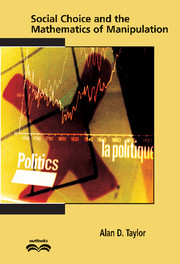Book contents
Preface
Published online by Cambridge University Press: 07 December 2009
Summary
Were honesty always the best policy, this indeed might be a better world. But there seems to be a place for the little white lie, and there is certainly reason for many supporters of Ralph Nader in the state of Florida – as they watched Albert Gore concede the U.S. presidential election to George W. Bush on the evening of December 12, 2000 – to regret having cast sincere ballots, the result of which was a victory for their third choice (Bush) instead of their second choice (Gore).
We have nothing to say here about the little white lie. In this book, however, we collect much of what is known regarding a single fundamental question of obvious political importance and surprising mathematical naturality: In what election-theoretic contexts is honesty in voting the best policy?
For example, consider an election in which there are three or more candidates from which a unique winner must be chosen, and in which each voter casts a ballot that gives his or her ranking of the candidates from best to worst with no ties. Can one, in this situation, devise a voting procedure such that each candidate wins at least one hypothetical election and with which no voter can ever gain by unilaterally changing his or her ballot?
- Type
- Chapter
- Information
- Social Choice and the Mathematics of Manipulation , pp. ix - xiiPublisher: Cambridge University PressPrint publication year: 2005



